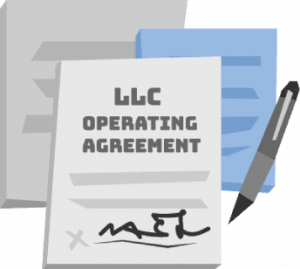How to start an LLC in Massachusetts
To form your limited liability company in MA, you must choose a business name and a registered agent, plus file a Certificate of Organization with the Massachusetts Secretary of the Commonwealth. The fee for LLC registration starts at $500, and most LLCs are approved within two business days if filed online.
In this guide, we’ll show you how to form an LLC in Massachusetts to help you protect your assets with an LLC and help it remain in good standing with the state.

1. Name Your LLC
The first thing to do when forming your business is choose your LLC name. Massachusetts sets certain rules for LLC names in M.G.L. ch:156C § 3. Your business name must:
- Include limited liability company, limited company, L.L.C., L.C., LLC, or LC.
- Be a unique business name in Massachusetts—not the same or deceptively similar to the name of any other business registered in the state.
If you’ve already decided on the perfect name, see if it’s available with a Massachusetts business entity search. And if you know your name is available, but you’re not ready to start your LLC, you can reserve a business name for 60 days. It costs $30 to do so.
DBA (doing business as) names let you do business with a name that is not the legal name of your LLC. Massachusetts handles DBAs differently than most other states, letting businesses register DBAs as business certificates at the local level.
You need a separate business certificate for every town or city where your LLC operates using a DBA name.
Note: Despite the similar-sounding name, Massachusetts business certificates are not the same as business licenses, which you may still need to operate in your city or town.
Yes. A domain name is your a web address online that connects to a website. While it is not required that you register your domain name or have a domain name for your business, securing one early is a smart move. When you register a domain for your company, you get a professional email that matches your business name and access to building a business website.
When Northwest forms your LLC, we help you register your domain name in less than 10 minutes and provide you with a pre-built website based on your specifications and brand design. Don’t need a website yet? No worries! You can still use your domain name to set up your business’s email accounts.

2. Designate a Registered Agent
Massachusetts law requires all LLCs to name a registered agent. A Massachusetts registered agent (sometimes called a resident agent in MA) is a person or business designated to receive legal mail on behalf of your LLC. Under M.G.L. ch: 156D § 5.01, this agent can be you, another individual, or a registered agent service like us.
You’ll need to include your resident agent’s name and street address (P.O. Boxes not allowed!) when you fill out your Certificate of Organization, so choose one ahead of time.
If you’re okay with your name and address becoming part of the public record, you can absolutely be your own Massachusetts resident agent. You’ll also need to be at the resident agent address listed in your formation documents during regular business hours to accept legal mail in person.
You’re free to change your Massachusetts resident agent at any time. Just file a Statement of Change of Resident Agent/Resident Office with the Secretary of the Commonwealth. You can submit the form by mail, in person, or fax, along with $25. Or you can file for free online.

3. Submit LLC Certificate of Organization
In order to officially form your MA LLC according to state statutes, you’ll need to file a Certificate of Organization with the Massachusetts Secretary of the Commonwealth, along with a $500 filing fee.
To complete the Certificate, provide the following information:
- Federal Identification Number. If you’ve already got an EIN number, list it here, but you can also obtain one after registering your LLC.
- Limited liability company name. Must include an indicator like LLC.
- Street address. The physical street address of the office where your LLC’s records are kept.
- General character of business. A brief statement of what your business does.
- Latest date of dissolution. Optional. The date your business will end, if applicable.
- Resident agent and address. Name and address of the person or company appointed to accept service of process for your LLC.
- LLC management. Names and business addresses (if different from your office street address) of all LLC managers, if your LLC has them.
- Authorized executors. Names and business addresses (if different from your office address) of any non-managers authorized to sign filings with the Corporations Division. You must provide information for at least one executor if your LLC has no managers.
- Person authorized for property. Optional. If you plan on buying property with the LLC, list the name of the person in your LLC who authorizes property purchases.
- Additional matters. Optional. Any additional articles you wish to include. For example, some LLCs include an article detailing the LLC’s management structure.
- Authorized signatory. The person who signs and submits the Certificate of Organization.
All information on the Certificate of Organization form becomes part of the public record.
If you already own an LLC and are looking to register it within a new state and foreign qualify it, you’ll want to register a foreign LLC in Massachusetts.
The costs to form a Massachusetts LLC are at least $500 to file a Certificate of Organization and set up your LLC in Massachusetts. Online filing costs an additional $20.
Massachusetts usually processes online LLC filings in less than two business days. Paper filings can take up to two weeks for approval.
You can submit your Certificate online, by mail, or in person.
Mail and in person:
Secretary of the Commonwealth
One Ashburton Place
Room 1717
Boston, Massachusetts 02108-1512
Massachusetts permits the formation of Professional Limited Liability Companies (PLLCs). These are LLCs that provide professional services, such as medicine or law. Members need to be certified or licensed by the state board that oversees those services. PLLCs file a slightly different Certificate of Organization with additional requirements related to members’ professional licenses.
LLCs members are the owners of the business. There are different types of LLC structures and formations from single member to multi-member to so many more.
All the information included on your Certificate of Organization will be publicly accessible. Fortunately, using a registered agent service can help you protect your information.
Hire us and we’ll use our business address everywhere possible on the Certificate of Organization, letting you keep your personal address to yourself and preserve your privacy.
Affordable Massachusetts
LLC Registration Help

Your LLC Is Formed. What's Next?

Write an LLC Operating Agreement
An operating agreement helps specify the details of how your LLC will be run. This internal written document should plan in advance for how to handle any matters that might be contested in the future—such as how much each member invested, how to distribute profits and losses, how member voting works, how to transfer membership, and how your LLC will handle any disputes.
Contact a lawyer or use our free MA LLC operating agreement template.
You’re not legally required to have an operating agreement for your LLC even in states like Massachusetts. However, a strong, written operating agreement that all LLC members agree upon is very important. Without one, your business will be required to follow Massachusetts’s default LLC statutes to guide its operations. Plus, if you intend to open a business bank account, you’ll likely need an operating agreement to get approved.
Definitely. An operating agreement won’t be needed to manage member disputes in a single-member LLC, but you’ll still need one to open a business bank account in order to maintain your LLC’s limited liability.

Get an EIN, Bank Account & Funding
Your LLC needs funding. But mixing personal and business accounts risks the limited liability that keeps the LLC separate from it’s members. To prevent that, you’ll need to open a bank account for your LLC.
That means you’ll need to get an EIN for your business, unless you’re a single-member LLC owner and would rather give out your own Social Security number. EINs (Employer Identification Numbers) are like Social Security numbers for businesses. The IRS uses your EIN to identify your LLC on tax filings.
Once you have a business bank account, you can fund the LLC. In most cases, each member makes an initial contribution that establishes their membership interest (percentage of LLC ownership).
You can get your EIN for free from the IRS. Or keep it simple and hire Northwest to handle your EIN for you.

File Taxes & Reports
LLCs in Massachusetts need to stay on top of their tax and reporting requirements. Those requirements include:
- Massachusetts LLC taxes: LLCs have pass-through tax status by default, so profits pass through the LLC to owners (members) and the LLC does not directly file income taxes. Owners instead report their share of LLC profits on their personal income tax returns, and those profits are subject to the federal self-employment tax rate (15.3%).
- Massachusetts annual reports: Annual reports filed with the Secretary of the Commonwealth ensure Massachusetts has up-to-date information on your LLC’s contact information and ownership. The Massachusetts Annual Report costs $500, plus an additional $20 when filed online. Sick of doing paperwork? We can file your annual report for you.
Yes. In Massachusetts, mandatory annual reports are due on the anniversary of your LLC’s formation date.
LLCs in Massachusetts are taxed as pass-through entities by default, but you can file paperwork with the IRS for S-corp or C-corp tax status instead.
Learn more about S-Corp vs LLC tax designation.
*This is informational commentary, not advice. This information is intended strictly for informational purposes and does not constitute legal advice or a substitute for legal counsel. This information is not intended to create, nor does your receipt, viewing, or use of it constitute, an attorney-client relationship. More information is available in our Terms of Service.
Ready to Start an LLC in Massachusetts?

